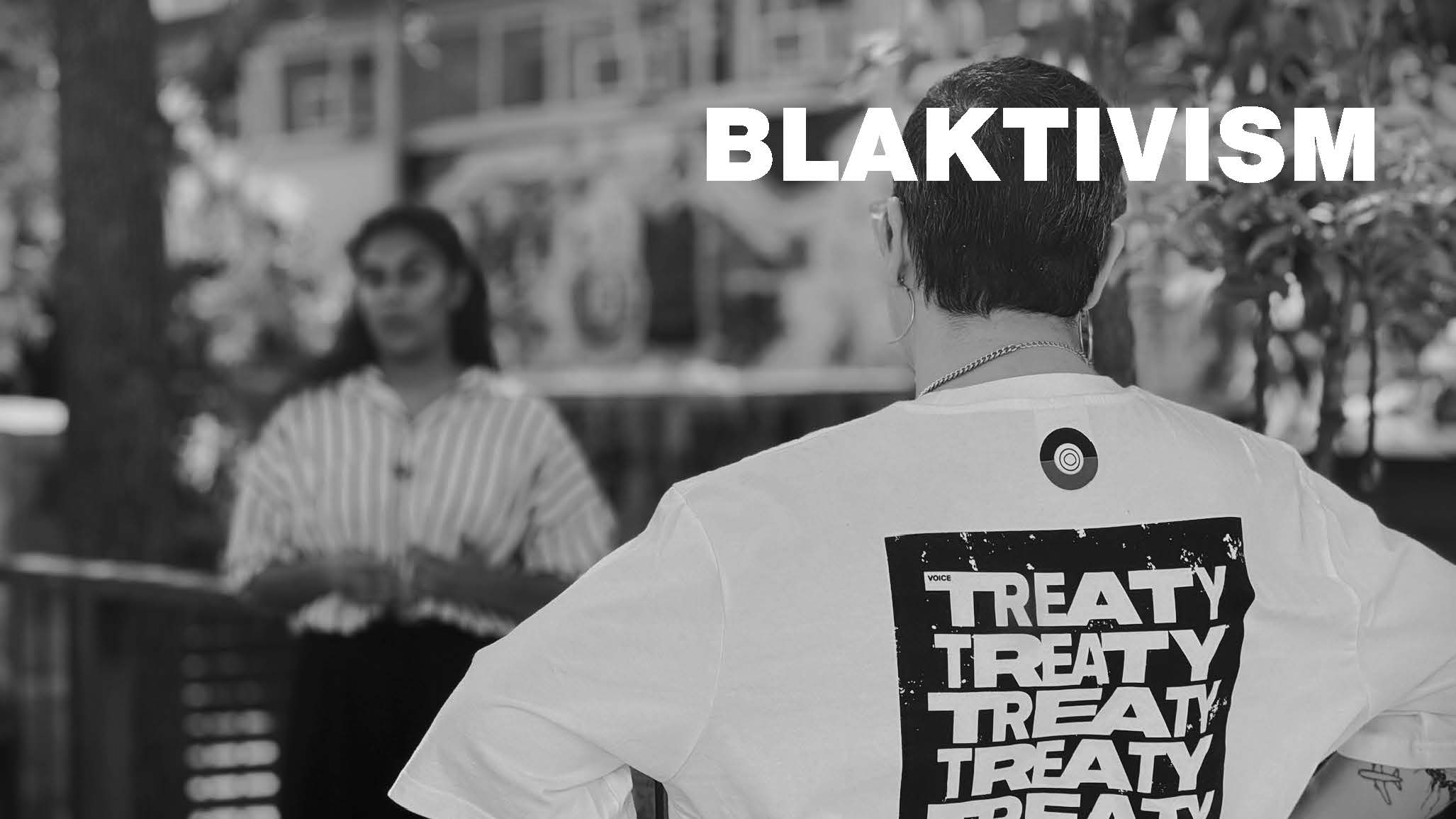Blaktivism
Blaktivism is a portmanteau of Blak and activism. It’s a word used by many Aboriginal and Torres Strait Islander communities to denote activism and political action by and for Aboriginal and Torres Strait Islander peoples. For many decades, UQ has been a staple in Brisbane politics and activism. This section will explore the Blaktivism enacted by UQ staff and students as well as Blaktivism by Aboriginal and Torres Strait Islander peoples alongside non-Indigenous allies.
Activism on Campus
Over the years, local and national activists and community leaders have come together at UQ to discuss politically and socially charged topics.
In 1967, Indigenous activists including the late Charles Perkins (1936-2000), Pearl Gibbs (1901-1983), and Joe McGinness (1914-2003) visited UQ’s St Lucia campus to campaign for the 1967 Australian referendum, which sought to recognise Aboriginal and Torres Strait Islander peoples as part of the Australian population under the Australian Constitution. More recently, staff and visiting guests came to UQ to hold discussions around the 2023 Australian Referendum, which sought to recognise Aboriginal and Torres Strait Islander peoples by establishing an Aboriginal and Torres Strait Islander Voice.
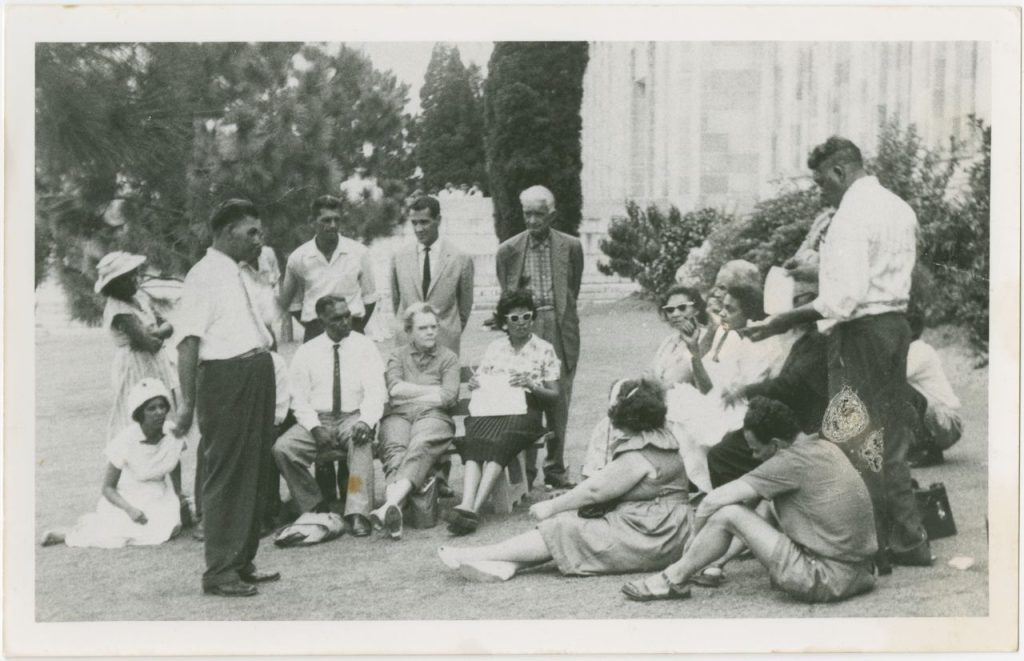
As visitors brought political and social discussion and debate to UQ, students were banding together within the university to create further change through the UQ Student Union. While the Union has largely avoided broad political issues, this was not the case for parts of the 1940s, late 1960s, 1970s and 1980s. Throughout the years, and especially during the latter half of the twentieth century, the Student Union focused on Aboriginal rights and discrimination. They were actively involved in organising protests at St Lucia campus to publicly support and raise awareness of issues such as land rights and self-determination.
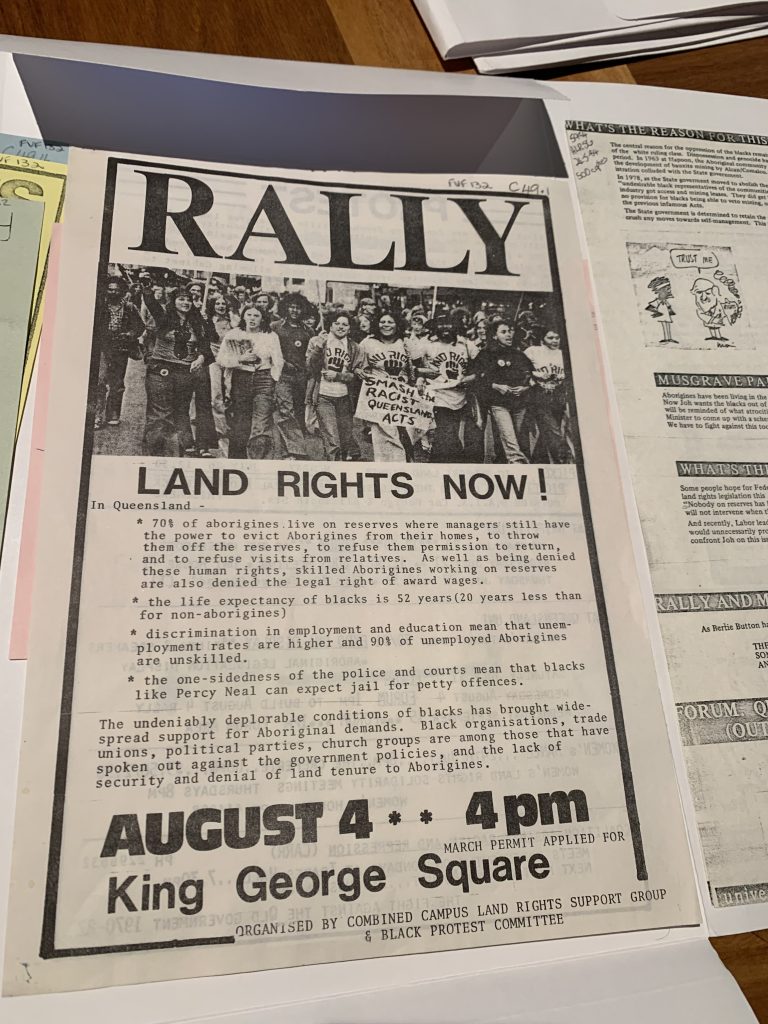
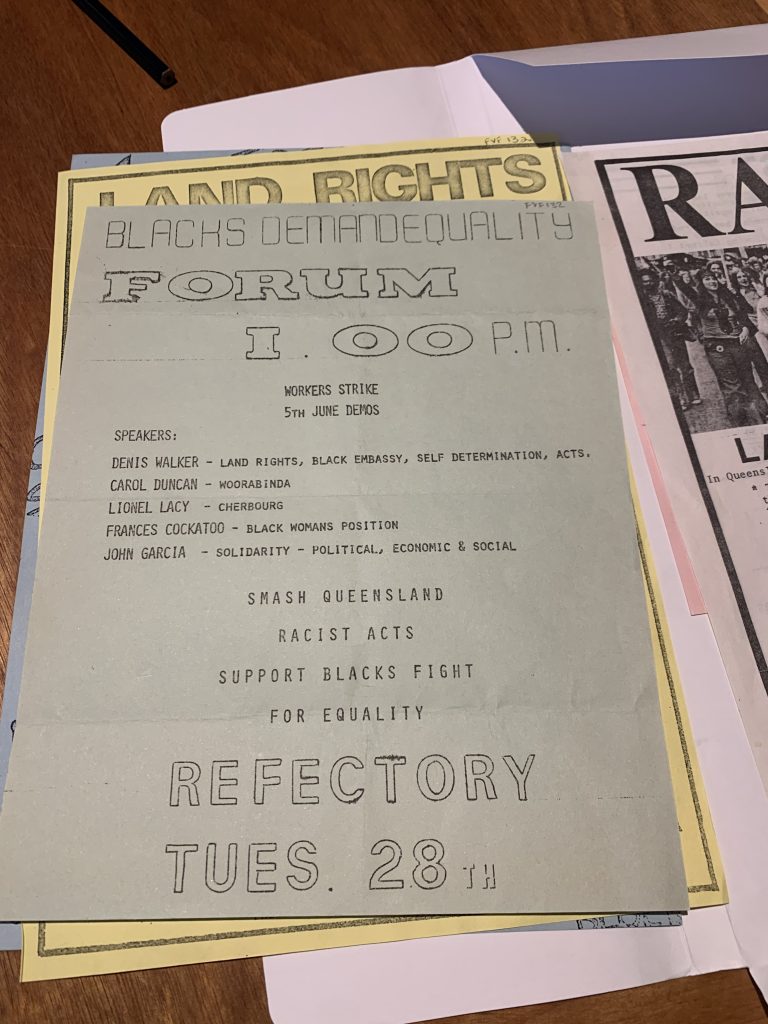
Springbok Tour and Anti-Apartheid Protests
When the South African rugby union team, the Springboks, toured Australia in 1971, numerous protests were held against the racist South African system of Apartheid (People’s History of Australia, 2020). The black majority population of South Africa mostly lived in poverty, had their movements restricted, had limited access to facilities and could not vote. Eighty per cent of the land was owned by the white minority. Only white players were allowed in the ruby union team and the team was a symbol of this racist system.
Despite this, the South African regime was backed by Western countries and the Springbok tour was supported by Australian political parties and the media (People’s History of Australia, 2020). UQ students, including representatives of the Student Union, led a rally from St Lucia campus into the Brisbane CBD protesting Apartheid. During this rally, Peter Beattie, later to become the Queensland Premier, was infamously arrested and bashed by police. Beattie was a UQ student at this time and was staunchly anti-Apartheid.
After this protest, it is said that a group of protesters returned to St Lucia campus and that the late Sam Watson gave his first public political speech in the Great Court where he spoke about his personal experience of being a UQ student, his meeting up with the white radical students, his own emergence as an activist, and the various campaigns in which the campus played a role, both during and after his time here as a student.
Australian Black Panther Party
The Australian Black Panther Party (BPP) was set up in 1971, with headquarters in Brisbane (Black History Studies, 2009). Initially, there were only 10 members including Indigenous activists Gary Williams, Paul Coe, Billy Craigie and Gary Williams. Basing their chapter on the American Black Panther, they addressed a range of issues including the elimination of discriminatory legislation, improved legal and health representation, equality in education and the abolition of police harassment.
While not specific to UQ, the BPP was established by two Aboriginal men who had strong ties to the University: Sam Watson and Denis Walker. A past student of UQ, Sam Watson (1952-2019) was a proud Birri Gubba elder, political activist, writer, orator, filmmaker, scholar, and so much more. He was the deputy director of the Aboriginal and Torres Strait Islander Studies Unit in 2009 and he was involved in implementing the findings of the Royal Commission into Aboriginal Deaths in Custody. Denis Walker (1947-2017) was a proud Noonuccal man, writer, orator, and political activist who fought for causes such as Aboriginal civil rights, land rights and treaty. He was also known as Bejam Kunmunara Jarlow Nunukel Kabool.
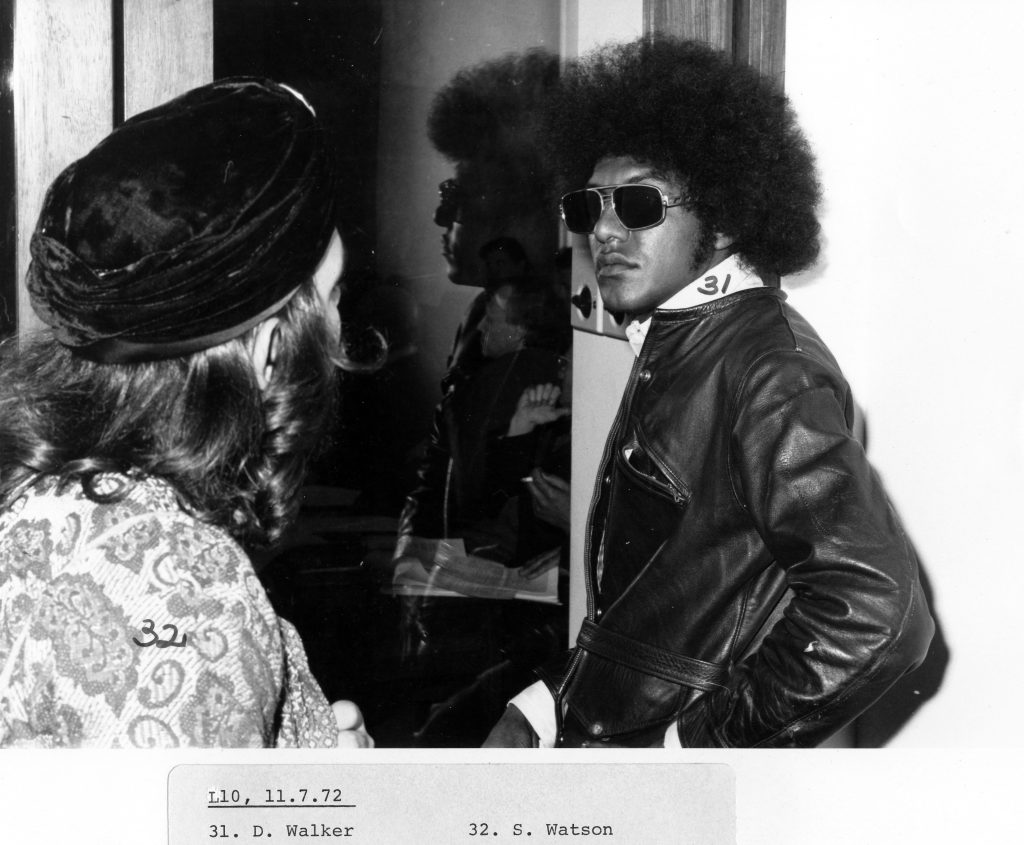
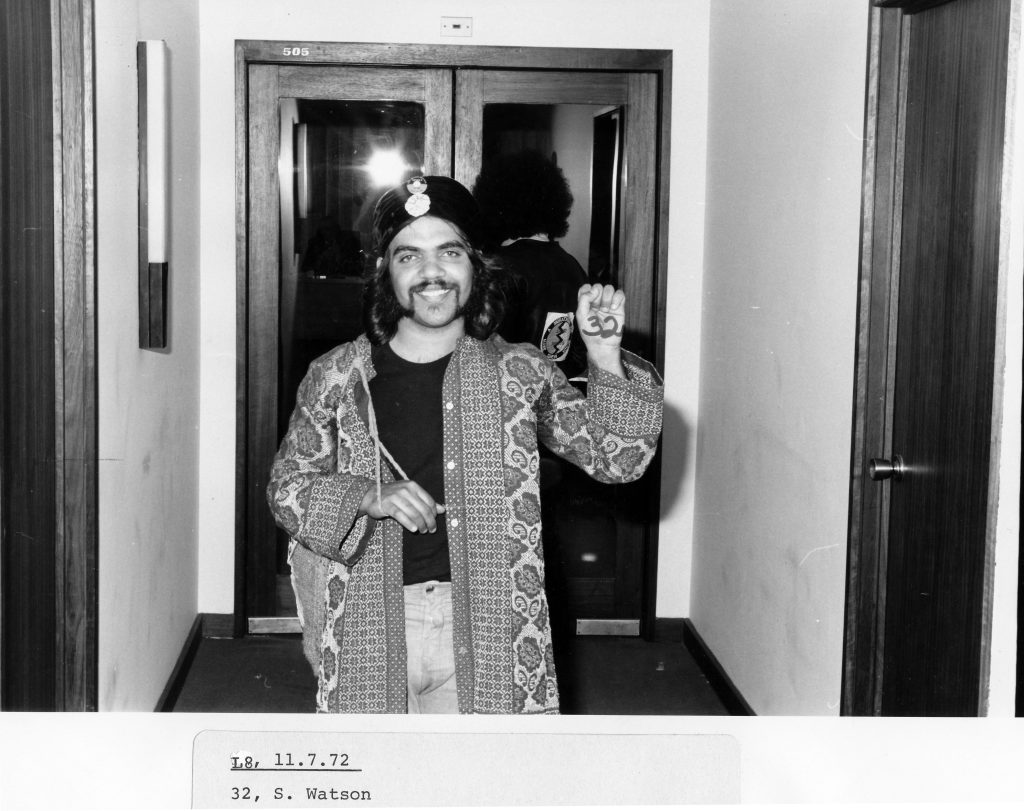
Murris on Radio
4ZZZ is a community radio station based in Brisbane. Currently broadcasting from Fortitude Valley, 4ZZZ originated here at UQ and is still seen as a platform for political activism, voices of people from all backgrounds, and good music.
In 1984, 4ZZZ first broadcast Murri Hour, a popular community radio segment that later moved to another Brisbane community radio station, Triple A (Murri Radio). During the early years of Murri Hour on 4ZZZ, Kev Carmody and Ross Watson would chat and perform live-to-air music. Other speakers and performers featured during Murri Hour, included Charlie Perkins, Toffee Wharton, Gary Foley, Mop & the Dropouts, Archie Roach, Maroochy Barambah, and more. Kev Carmody once referred to Murri Hour as an ‘open conference’ where the Brisbane Black community was able to discuss social, cultural and political issues of the day.
In 1988, Murri Hour was cancelled by the University. However, the broadcast continued and eventually led to the establishment of the Brisbane Indigenous Media Association that still exists today. Today, Murri Hour can be heard on Triple A (Murri Radio) every Monday-Thursday from 2-3pm. While 4ZZZ no longer resides at UQ and Murri Hour has found a new home, community radio in Brisbane has been and continues to be a staple of our local community.
Video overview of the chapter – UQ has a Blak history – Blaktivism (YouTube, 2m 8s):
References and Resources
4ZZZ. (2020). Looking back at the Murri Hour. https://pod.link/1542143375
4ZZZ. (2020). Looking back at the Murri Hour, Part 2. https://pod.link/1542143375
AIATSIS. (2021). The 1967 Referendum. https://aiatsis.gov.au/explore/1967-referendum
Fryer Library Manuscripts. FVF310 – Queensland Anti-Apartheid Movement Ephemera. https://manuscripts.library.uq.edu.au/index.php/fvf310
Fryer Library Manuscripts. FVF518 – 4ZZZ (Radio Station : Brisbane, Qld.) Ephemera. https://manuscripts.library.uq.edu.au/index.php/fvf518
Fryer Library Manuscripts. FVF62 – Black Panther Party of Australia (Brisbane Chapter) Ephemera. https://manuscripts.library.uq.edu.au/index.php/fvf62
Fryer Library Manuscripts. UQFL194 – University of Queensland Union Records. https://manuscripts.library.uq.edu.au/index.php/uqfl194
Fryer Library Manuscripts. UQFL440 – Andrew Stafford Papers. https://manuscripts.library.uq.edu.au/index.php/uqfl440
Fryer Library Manuscripts. UQFL474 – Carole Ferrier Papers. https://manuscripts.library.uq.edu.au/index.php/uqfl474
Mackintosh, G. (2022). Big things will grow. Contact Magazine. https://stories.uq.edu.au/contact-magazine/2022/big-things-will-grow-kev-carmody/index.html
Radical times. (2013). 4ZZZ-FM. https://vimeo.com/81683921

